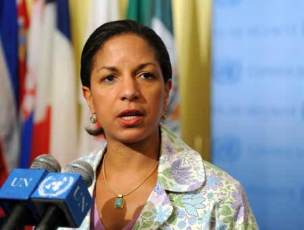Sudan denies its citizens taking refuge in south, US says bombing denial ‘blatant lie’
November 11, 2011 (WASHINGTON) – Sudan went on the defense a day after reports of an aerial bombardment conducted by its air force on a refugee camp inside the borders of South Sudan which drew strong rebuke from the White House and rights groups.

South Sudan officials claimed twelve people were killed and seriously injured 20 others. However, aid groups on the ground denied any casualties although they confirmed the bombings.
Senior United Nations officials today including Under Secretary General for Peacekeeping Operations Hervé Ladsous and head of the United Nations Mission in South Sudan (UNMISS) Hilde Johnson confirmed the incident in their briefings to the United Nations Security Council (UNSC).
Ladsous said that at least two bombs were dropped near the camp, while Johnson reported two bombs fell inside the camp and three outside. Neither of the two UN officials gave any casualty figures.
The UN peacekeeping chief warned of further escalation in the region.
“It is absolutely imperative that both governments take the necessary steps to de-escalate the situation, ensure that civilian lives are protected, and resume peaceful dialogue,” Ladsous said.
The Sudanese UN ambassador, Dafalla Haj Osman vehemently denied that SAF carried out any bombings inside their southern neighbour’s territories.
“There is no aerial bombardment; we did not exercise any kind of military activity outside our borders,” he told reporters following the UNSC session on Sudan.
Asked about confirmation from the BBC and Reuters correspondents at the scene, the Sudanese envoy suggested that the two are ‘biased media’ outlets that are favouring rebels.
The Sudanese diplomat criticised the UNMISS chief saying he had hoped that she would be impartial in her report to the UNSC and reflecting on her role as a mediator during the North-South peace talks which led to the signing of the 2005 Comprehensive Peace Agreement (CPA).
He described Johnson’s remarks today as someone who is an attorney working on behalf of South Sudan.
Osman reiterated accusations that the South Sudanese government is providing support to SPLM-N fighters in South Kordofan, as well as Blue Nile state where the SAF is battling the rebels.
He referred to the Kauda alliance signed between SPLM-N and Darfur rebels, inked this year with the stated goal of toppling the regime in Khartoum. The latter has accused South Sudan of helping in bringing the parties together.
South Sudan’s acting UN representative, David Buom Choat, rejected the allegations.
“We have not supported anybody that is fighting Sudan,” Choat said. “But it has been the attitude of the Republic of Sudan to always blame others for their own problems.”
This week South Sudan’s president, Salva Kiir, slammed his northern counterpart, Omer Hassan al-Bashir’s public threat of war against his country in retaliation to support he said the new nation is providing to SPLM-N rebels battling Khartoum.
The US ambassador at the UN, Susan Rice, dismissed Osman’s assertions.
“This is not the only such bombing in recent days, but it is incontrovertible. And the fact that the representative of the government of Sudan came to the Council and blatantly lied is quite disturbing to the United States and to many other members of the Security Council,” Rice said.
“This is a moment where both sides need to show maximum restraint. In the first instance, the government of Sudan needs to halt all offensive actions against the south immediately and the south needs to have the wisdom and restraint not to take the bait and not to respond in kind,” she added.
She also suggested that the UNSC will be scrutinising the recent developments.
“We will be talking about ways that, as a Council, collectively and individually as member states, we might prevail on the parties to de-escalate and return to the negotiating table and resolve the critical issues that divide them that can only be addressed through negotiations,” the US official said.
Washington is drafting a UNSC statement condemning the bombing, which it hopes the 15-nation body will adopt on Tuesday in New York, council diplomats told Reuters. It is not clear of the draft directly blames Khartoum for the attack.
In Khartoum the Sudanese foreign ministry spokesperson, Al-Obaid Marawih said that no refugee camps exist in South Sudan for Sudanese citizens.
Marawih said there are actually gatherings or camps of rebels which could easily be confirmed by the UN Higher Commission for Refugees (UNHCR).
South Sudan seceded from the north in July after a referendum held last January showed an overwhelming majority of Southerners favouring their own state.
Despite early optimism on cordial relations between the two neighbours, hopes were dashed when Khartoum and Juba exchanged accusations over support to rebel groups on both sides of the borders.
The two countries are still in negotiations on a wide array of post-secession issues such as borders, Abyei, oil, national debt that were supposed to have been concluded prior to the breakup.
Meanwhile, the top officials in the Office of the UN High Commissioner for Human Rights (OHCHR) called for an investigation into the attack saying it could amount to a war crime.
“There needs to be an independent, thorough and credible investigation to establish the precise circumstances of this aerial bombing,” said OHCHR head Navi Pillay.
“If indeed it is established that an international crime or serious human rights violation has been committed, then those responsible should be brought to justice,” Pillay added.
(ST)
